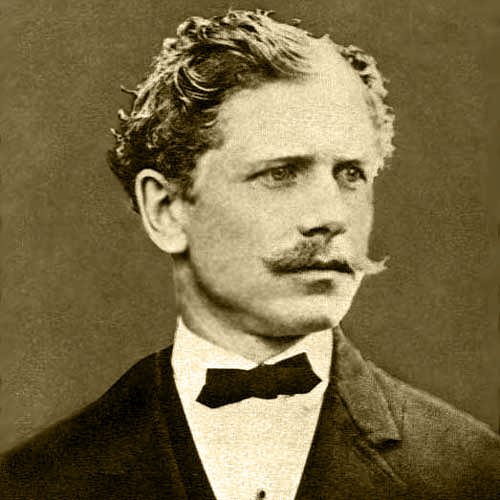
“It is unknown to me why a Christmas should be always merry but never happy, and why the happiness appropriate to the New Year should not be expressed in merriment. These be mysteries in whose penetration abundance of human stupidity might be disclosed.”
A curmudgeonly essay from the great American writer, Ambrose Bierce, first published in 1877, about our annual celebration of the birth of Jesus. Many of his observations and conclusions are still valid in 2013.
In our manner of observing Christmas there is much, no doubt, that is absurd. Christmas is to some extent a day of meaningless ceremonies, false sentiment and hollow compliments endlessly iterated and misapplied. The observances “appropriate to the day” had, many of them, their origin in an age with which our own has little in common and in countries whose social and religious characteristics were unlike those obtaining here. As in so many other matters, America has in this been content to take her heritage without inquiry and without alteration, sacredly preserving much that once had a meaning now lost, much that is now an anachronism, a mere “survival.” Even to the Christmas vocabulary we have added little. St. Nicholas himself, the patron saint of deceived children, still masquerades under the Spanish feminine title of “Santa” and the German nickname of “Claus.” The back of our American coal grate is still idealized as a “yule log,” and the English “holly” is supposed in most cases fitly to be shadowed forth by a cedar bough, while a comparatively innocuous but equally inedible indigenous comestible figures as the fatal English “plum pudding.” Nearly all our Christmas literature is, longo intervallo, European in spirit and Dickensish in form. In short, we have Christmas merely because we were in the line of succession. We have taken it as it was transmitted, and we try to make the worst of it.
The approach of the season is apparent in the manner of the friend or relative whose orbs furtively explore your own, seeking a sign of what you are going to give him; in the irrepressible solicitations of babes and cloutlings; in wild cascades of such literature as Greenleaf on Evidence, for Boys (“Boot-Leg” series), The Little Girls’ Illustrated Differential Calculus and Aunt Hetty’s Rabelais, in words of one syllable. Most clearly is the advent of the blessed anniversary manifest in maddening iteration of the greeting wherein, with a precision that never by any chance mistakes its adjective, you are wished a “merry” Christmas by the same person who a week later will be making ninety-nine “happies” out of a possible hundred in New Year greetings similarly insincere and similarly insufferable. It is unknown to me why a Christmas should be always merry but never happy, and why the happiness appropriate to the New Year should not be expressed in merriment. These be mysteries in whose penetration abundance of human stupidity might be disclosed. By the time that one has been wished a “merry Christmas” or a “happy New Year” some scores of times in the course of a morning walk, by persons who he knows care nothing about either his merriment or his happiness, he is disposed, if he is a person of right feeling, to take a pessimist view of the “compliments of the season” and of the season of compliments. He cherishes, according to disposition, a bitter animosity or a tolerant contempt toward his race. He relinquishes for another year his hope of meeting some day a brilliant genius or inspired idiot who will have the intrepidity to vary the adjective and wish him a “happy Christmas” or a “merry New Year”; or with an even more captivating originality, keep his mouth shut.
As to the sum of sincerity and genuine good will that utters itself in making and accepting gifts (the other distinctive feature of holiday time) statistics, unhappily, are wanting and estimates untrustworthy. It may reasonably be assumed that the custom, though largely a survival–gifts having originally been given in a propitiatory way by the weak to the powerful–is something more; the present of a goggle-eyed doll from a man six feet high to a baby twenty-nine inches long not being lucidly explainable by assumption of an interested motive.
To the children the day is delightful and instructive. It enables them to see their elders in all the various stages of interesting idiocy, and teaches them by means of the Santa Claus deception that exceedingly hard liars may be good mothers and fathers and miscellaneous relatives–thus habituating the infant mind to charitable judgment and establishing an elastic standard of truth that will be useful in their later life.
The annual recurrence of the “carnival of crime” at Christmas has been variously accounted for by different authorities. By some it is supposed to be a providential dispensation intended to heighten the holiday joys of those who are fortunate enough to escape with their lives. Others attribute it to the lax morality consequent upon the demand for presents, and still others to the remorse inspired by consciousness of ruinous purchases. It is affirmed by some that persons deliberately and with malice aforethought put themselves in the way of being killed, in order to avert the tiresome iteration of Christmas greetings. If this is correct, the annual Christmas “holocaust” is not an evil demanding abatement, but a blessing to be received in a spirit of devout and pious gratitude.
To read another diatribe by “Bitter” Bierce on Christmas, click here.


















